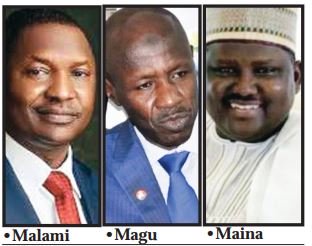By Segun Ayobolu
There have been at least three important developments on the ongoing saga involving the Attorney General of the Federation (AGF), Mr. Abubakar Malami, and the suspended Acting Chairman of the Economic and Financial Crimes Commission, (EFCC), Mr. Ibrahim Magu, since the publication of the first part of this piece last week. First, Malami himself has felt sufficiently disturbed by serious allegations of graft leveled against him by a coalition of civil society organizations to ‘proactively’ write President Muhammadu Buhari pronouncing his innocence of all the charges of corrupt enrichment.
In the letter to PMB, Malami asserted that he was already a wealthy man before his appointment to public office in 2015 having run a successful legal practice for over 20 years. He drew the President’s attention to “the 27 property” listed in the assets declaration he filed with the Code of Conduct Bureau (CCB) on assumption of office as AGF and stressed that “Among other things, I owned lucrative business ventures of Rayhaan Hotels and Rayhaan Food & Drinks, both in Kano, since December 13, 2013,…long before I was appointed to be a minister in the first term”.
Of course, the AGF deserves plaudits for his eagerness to protect his obviously highly cherished name and reputation. But then as a respected senior lawyer, he ought to know that things don’t work that way. After all, how would he have felt if, rather than respond in concrete detail to the grave allegations against him, Magu had simply written his superiors affirming his innocence. That would have been unacceptable and Malami has done the right thing in demanding that Magu demonstrate his innocence beyond all scintilla of doubt. But such a commendably high standard of integrity and accountability must necessarily apply to the AGF too in the interest of justice and equity. In any case, human greed is infinitely elastic and numerous persons far wealthier than Malami have been appointed into public office only to perpetrate outrageous acts of grand corruption. Secondly, the President has widened the mandate of the Justice Ayo Salami panel probing the AGF’s allegations against Magu granting it judicial powers and mandating it to conduct public sittings and submit its report 45 days after its first public session. Again, this is commendable as it will enhance the transparency, openness and public access to the panel’s proceedings. The secret nature of the panel’s work thus far had encouraged wild and unfounded publications in both the traditional and social media, which it unfortunately did nothing to refute or discourage.
But then, why shouldn’t this have been the case from day one? Does this not create the impression of improvisations being made along the way and goal posts shifted arbitrarily to reach a predetermined end? Furthermore, even though it now has a more transparent procedural mandate, the panel still remains as supposedly constituted or largely influenced by the AGF. Is this not a case of the accuser being also, directly or indirectly, picking those to try the accused? Can justice be served with this arrangement? Should not the allegations against Magu, having been exhaustively investigated by two previous presidential panels, not have simply proceeded to the regular courts, which are less likely to be under the influence of either interested party in the matter?
Thirdly, Magu has had cause to write the Justice Salami panel seeking clarification as to whether its new 45-day timeline would commence from July 3rd, when the instrument establishing it was dated, or August 8th when he was formally served. Other complaints in Magu’s letter, to the panel include that “The panel has consistently sat in private (camera) and not in public in accordance with the applicable law; The tribunal has held proceedings and invited and entertained witnesses to the exclusion of our client in violation of the applicable rules of fair hearing; The tribunal has sat and conducted hearings in the absence of our client in violation of the applicable law and rules of fair hearing”.
Magu also drew the panel’s attention to “The suspension of twelve officials (investigators and prosecutors) of the EFCC without query, interrogation, or any other expected standard treatment for such an action; Failure to allow Mr. Magu’s counsel to cross-examine our client’s accusers and witnesses; Failure of the committee to reveal its mandate, terms of reference and timeline until 8th August, 2020, 35 days after the panel was expected to have commenced public sitting by virtue of the instrument of mandate; Witnesses appearing without being on oath; Our client and his counsel were excluded from the proceedings of 11th, 12th and 13th of July, 2020, amongst others in spite of presence at the venue of the sittings; As a judicial commission of inquiry in the nature of a tribunal, an inferior court, the panel lacks the powers to entertain matters pending before superior courts of record as it is reportedly doing”.
Surely, these are not observations and complaints which a panel headed by a jurist of Justice Salami’s stature can treat lightly. The credibility of the panel’s work in the eyes of the attentive public rests entirely on the chairman’s reputation for integrity even though he is only one of a 7-man panel. Let us now continue with our interrogation of the linkage of AbdulRasheed Maina, former Chairman of the Pensions Reform Task Team (PRTT), to the unfolding Malami/Magu saga.
Interestingly, the current allegations against Magu being probed by the Salami panel is not the first time that the ex-EFCC Acting Chairman will face serious charges of wrongdoing against which he has had to defend his integrity and reputation. In the wake of Maina’s surreptitious return to the country and reinstatement into the federal civil service in 2017, despite being a fugitive from the law, some unidentified persons had filed a petition against him before a Committee of the Senate alleging that Magu and his collaborators had engaged in large scale re-looting of assets seized from pension fraud suspects.
In a fact sheet he made available to the National Assembly in December 2017, widely reported in the media, Magu vehemently denied this allegation submitting that “The assets seized from these suspects are in two categories. There are assets that are under interim forfeiture, which means that they are temporarily seized pending the determination of the substantive cases in court. Such assets cannot be dissipated because the cases are pending in court. The reality is most of the assets recovered from pension fraud suspects belong in this category. The cash element of the recoveries is also carefully documented. The total funds recovered stand at N2,886,743,016.71, $3,017,556.73 and 3,385.40 Euros. The sum of N16,185,131,847.09 which was recovered from an illegal account in an old generation bank has since been remitted to the office of the Head of Service while N369,558,640 represents the cash component of John Yusuf’s final forfeiture. There is no opacity regarding the commission’s handling of the assets recovered from suspects of pension fraud”.
According to media reports in December 2017, Magu in his fact sheet to the National Assembly “challenged the brains behind the rumour of re-looting to go “the whole hog to name the ghost officials that engaged in this “sharing” of pension booty and the place and time the sharing took place”. He “insisted that former Chairman of the Pension Reform Task Team, Abdulrasheed Maina remains wanted by the anti-graft agency but said Maina’s $2 million Abuja mansion and six others have been placed under interim forfeiture. Magu said there was no cause for alarm because all seized assets were well documented. He said what was playing out was a “diversionary gambit intended to befuddle ongoing inquiry over the Maina reinstatement saga by smearing anyone or agency that is capable of unmasking the pension thieves”.
It is instructive that Magu at that time complained that “The EFCC views with grave concern the manner in which the allegation, made by unnamed person(s) in close-door session before the committee was publicly orchestrated at the Senate plenary without the commission having the opportunity to respond. The omission has tragically led to misinformation regarding the status of recovered pension assets. This is unwarranted”.
Obviously, Maina has friends in high places not excluding the AGF. With Magu suspended from office and 12 members of his management team sacked, the same team that had tenaciously refused to let go the Maina case, the AGF is now clearly fully in control of the anti-graft commission. Given this scenario, what happens to the EFCC’s prosecution of the allegations of gargantuan fraud against Maina? Surely, the attentive public is watching.
Source: thenationonlineng.net






